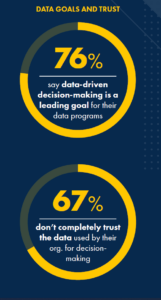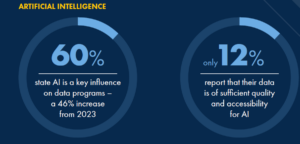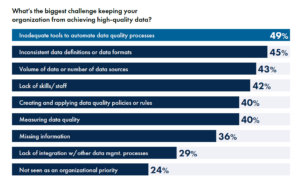
(Peshkova/Shutterstock)
As firms start adopting AI, they’re taking a more in-depth have a look at their information and ramping up information governance packages. That’s the excellent news. However upon nearer inspection of their information, they’re discovering that it’s less than the duty of making reliable AI. That’s the dangerous information popping out a brand new report from Exactly.
Exactly commissioned Drexel College’s LeBow School of Enterprise to analysis and write its newest “2025 Outlook: Knowledge Integrity Developments and Insights” report, which explores the state of knowledge integrity and AI readiness.
Among the report’s conclusions could appear counterintuitive at first. As an illustration, the research, which is predicated on a survey of 565 information and analytics leaders, discovered that 76% of organizations say data-driven decision-making is a number one objective for his or her information packages. Nonetheless, 67% of survey respondents say they don’t fully belief the information their group makes use of for decision-making.
The report additionally discovered that 60% of organizations state that AI is a key affect on information packages, which is a large improve from the 2023 report. However however, solely 12% of survey respondents report that their information is AI-ready, indicating a disconnect between the information and AI aspirations of firms and the truth on the bottom.
Tendü Yogurtçu, CTO Exactly, says she was not stunned that belief in information goes down as investments in information are going up.
“I feel these AI initiatives are actually creating extra focus. How are we going to leverage our information? How are we going to start out? Which use case could have use of AI?” she tells Huge Knowledge Wire in an interview. “And it’s driving slightly little bit of extra of look into information maturity and basis and resulting in that mistrust.”
It’s disappointing that the elevated concentrate on information administration and governance just isn’t translating into higher high quality, Yogurtçu provides.
“I feel belief and transparency shall be vital for elevated AI adoption,” she says, “and lack of knowledge governance is simply the other of that belief and transparency.”
Different elements driving the shortage of belief that organizations have of their information are the massive investments that firms are making into information merchandise and the push to modernize information platforms within the cloud, Yogurtçu says. Each of these initiatives require robust information foundations, which simply don’t broadly exist in the actual world, she says.
The survey additionally discovered that, whereas 76% of organizations say data-driven decision-making is a high objective for his or her information packages, 67% nonetheless don’t fully belief the information they depend on for these choices. That’s a rise from the 55% who lacked full belief of their information in 2023, in line with Yogurtçu.
It might appear as if we’re shifting backward with regard to information high quality and information trustworthiness over time. However one other risk–one thing that Yogurtçu agrees might be extra seemingly–is that the information high quality itself could also be staying comparatively fixed, however firms are simply changing into extra conscious of the information high quality points which have all the time been there on account of the higher scrutiny that comes with higher information administration packages.
“We’re seeing that AI is closely impacting how they give thought to information administration and the way they give thought to information integrity total, and I feel that’s resulting in how do I make it possible for I’ve my information governance in place,” she says.
It’s clear that generative AI is driving a lot of the curiosity in enhancing information administration. That raises an attention-grabbing query: What would firms consider their information high quality if ChatGPT by no means occurred? Yogurtçu says it has modified priorities.
“I feel if ChatGPT didn’t occur, if it wasn’t within the image, we wouldn’t have this sense of urgency for information governance,” she says. “I feel that is now creating a way of urgency.”
The primary impediments to excessive information high quality cited by the report embrace insufficient instruments for automating information high quality processes, inconsistent information definitions or information codecs, the quantity of knowledge or variety of information sources, a scarcity of abilities or employees, the power to create or apply information high quality insurance policies or guidelines, measuring information high quality, lacking data, lack of integration with different information administration processes, and a scarcity of institutional priorities.
“One of many issues that we see occurring is because of numerous information silos, they don’t seem to be in a position to even have visibility to how that information travels, what occurs between a number of transformations or journey via that information pipelines and the information integrity, high quality, or observability journey,” Yogurtçu says. “They don’t seem to be in a position to mainly see what’s occurring to their information.”
The report discover a majority of organizations are planning to make use of information for AI, with information evaluation by far the highest AI use case, adopted by customer support and assist, content material writing, workflow copilots, fraud and risk detection, buyer segmentation and personalization, and code writing as the highest use circumstances.
The primary obstacles to reaching these AI targets embrace information high quality, as earlier said, but in addition a scarcity of technical infrastructure, the extent of worker abilities in AI, availability of economic assets, organizational tradition in assist of AI, governance, and enterprise technique alignment, the report states.
The 32-page report goes into nice element on many facets of knowledge integrity and information belief, together with the way it’s modified through the years, in addition to how US organizations evaluate to worldwide corporations.
As an illustration, 60% of survey respondents indicated information high quality is a high precedence for 2024, in comparison with 54% in 2023. Equally, information governance is a high precedence for 57% of organizations this yr, in comparison with 41% final yr. Knowledge catalogs was reported as a precedence for 25% of survey respondents this yr, whereas information replication garnered an 18% share; each of these decisions are new to the report in 2024. Knowledge meshes and information materials had been cited as “key influential traits” by 18% of the survey respondents in 2024, up 5 proportion factors from final yr.
Exactly’s report features a part on location analytics, which is without doubt one of the firm’s product specialties. The share of survey respondents indicating location analytics (or spatial analytics) as a precedence went up from 13% in 2023 to 21% in 2024. Spatial analytics requires a eager consideration to element, Exactly says.
“Location information have to be of the very best integrity to totally harness its potential for enhanced analytics, reporting, and extra knowledgeable decision-making,” the corporate says within the report. “Reaching this integrity requires instruments to scrub up current data and derive new location-based attributes via spatial analytics and information enrichment.”
Enhancing location intelligence is without doubt one of the quickest rising priorities for enhancing the integrity of knowledge and thereby enhancing high quality of insights derived from that information, Yogurtçu says.
“For instance, for an insurance coverage firm, let’s say that you simply need to do a threat evaluation and worth accordingly,” she says. “You should have the situation and property boundaries and numerous attributes associated to that location–How far it’s from wildfire zone? How far it’s from flood zone? How far it’s from colleges? Is it near water provide?–a bunch of attributes that you simply wish to enrich on high of that location.”
This location information is changing into much more vital for AI as firms start adopting massive motion fashions (LAMs) alongside retrieval augmented technology (RAG) methods to automate particular duties, she says. But it surely doesn’t get very far with out good information.
“Knowledge high quality stays one of many high challenges. And information governance adoption has risen,” Yogurtçu says. “And we’re additionally seeing that elevated investments for location insights and information enrichment.”
You’ll be able to obtain Exactly’s report right here.
Associated Objects:
Legacy Knowledge Architectures Holding GenAI Again, WEKA Report Finds
Concentrate on the Fundamentals for GenAI Success
On the Origin of Enterprise Perception in a Knowledge-Wealthy World



